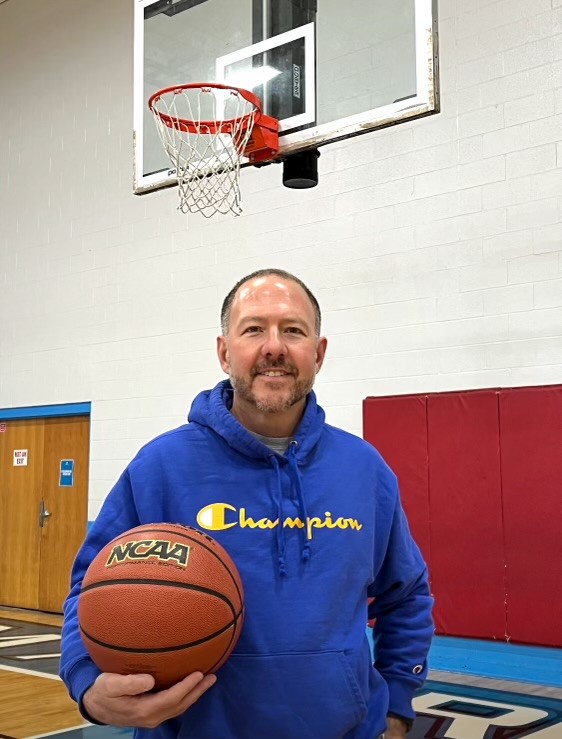 March Madness may be coming to an end, but for state employee Bill McCleery, basketball is more than just a game.
March Madness may be coming to an end, but for state employee Bill McCleery, basketball is more than just a game.
It's therapy. And the season doesn't end in March; it's year-round.
In February 2022, Bill was diagnosed with Parkinson's—a degenerative muscle disease that affects approximately 1 million Americans. But instead of shutting down, Bill started moving.
Before his diagnosis, Bill had always been moderately active, playing basketball and bicycling. But by his own admission, “before the diagnosis, I had become a little bit complacent. And then the Parkinson’s sort of gave me a jolt and made me realize that I needed to do everything possible to stay active.”
There's a saying among people with Parkinson's: “The more you keep moving, the more you’ll be ABLE to keep moving.” While the adage applies to everyone, it is especially true for those with Parkinson's disease.
The condition often leads to muscle rigidity, impaired balance and slowed movement, creating a vicious cycle in which movement decreases as it becomes more difficult—which then worsens the very symptoms that movement helps alleviate. Regular exercise is vital to combating the progression of Parkinson's disease and can improve flexibility, strength, and coordination.
Bill’s diagnosis came after he began experiencing persistent cramping in his left foot in late 2020. He was still in his late 40s. As he sought answers, he also developed increasing difficulty walking. When a group of friends resumed playing basketball in 2021 after a COVID-related layoff, he was forced to decline an invitation to rejoin the games.
After finally getting diagnosed by a movement-disorder specialist—and starting a regimen of the Parkinson’s drug carbidopa-levodopa—his cramps largely resolved and his walking returned to mostly normal. So Bill contacted his old basketball group and began playing again.
Now he generally plays twice a week—at a school on the Eastside of Indianapolis most Sunday nights and at a Greenfield gym mid-week.
Although Bill lives with various Parkinson’s symptoms such as muscle rigidity and involuntary movements called dyskinesia, he says they seem to disappear when he’s playing basketball.
“I’m really thankful to be able to play again,” Bill said. “I know it won’t last forever. I mean, life itself doesn’t last forever. But for now, it’s great to be able to run around the court and get great exercise. And it’s more than just basketball. It’s fellowship and friendship. It’s therapy.”
He said that rather than just prolong his playing days, he’s actually trying to improve each week.
“I’m determined to start making my layups someday,” he laughed. “I’m working on that. Sometimes I get lucky and shoot OK, but I miss a lot of close-up shots when I try to drive inside.”
Bill's determination on the court extends to other aspects of his life. He expressed gratitude to his employer at the State of Indiana, the Office of Attorney General Todd Rokita, with providing a culture of flexibility that enables Bill to stay productive while managing his disease. Working as a speechwriter at the state provides not only income and health insurance but also a sense of purpose that drives him forward. It's a reminder that his condition does not define him.
Beyond exercise, Bill finds encouragement from his family—including his wife, Amy, and their three daughters. He also draws inspiration from others who have battled Parkinson's for many years.
“I’ve gotten to know people who’ve had Parkinson’s for 15 or 20 years who are still doing pretty well," Bill said. "One friend of mine whom I met via Facebook, Steve Squires, was diagnosed in his mid-20s with Parkinson’s, and now he’s in his mid-40s. He’s still a great bowler, and he still tints windows and installs remote starts on vehicles.”
Bill also leans on faith, which encourages him to focus on the good to be found in difficult situations that may not yet be apparent.
Bill's determination to keep moving is a testament to his pragmatism and optimism. He focuses on winning the daily battles, not distant and uncertain futures. Last fall, Bill officiated his second-oldest daughter’s wedding. He is looking forward to his eldest daughter's wedding this summer while appreciating that his youngest daughter still lives at home with Bill and his wife. These milestones aren't just fleeting joys for Bill; they're tangible representations of hope as he charts his future with Parkinson's.
April marks Parkinson's Awareness Month, a time to shine a light on this progressive neurological disorder. Parkinson's disease affects approximately one million people in the United States and over 10 million globally. The condition arises from the degeneration of nerve cells in the brain, leading to a decline in dopamine production. This crucial neurotransmitter controls movement, resulting in hallmark symptoms like tremors, stiffness, and difficulty with balance. While there is currently no cure for Parkinson's, treatments including medication and therapies focus on managing symptoms and improving quality of life. Research continues to make advancements toward better treatment options and, ultimately, a cure for this debilitating disease.
If you are interested in participating in a 5k on April 27 benefiting the Indiana Parkinson Foundation, Bill invites you to join his team “Bill’s Hickory Huskers” by clicking here.